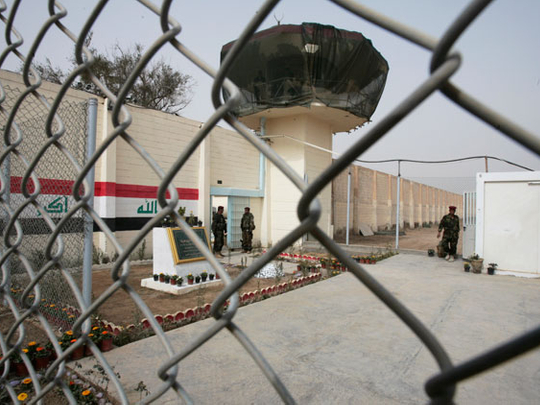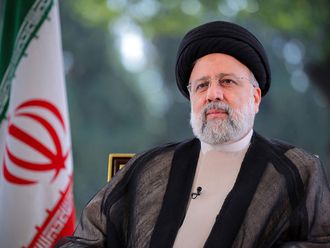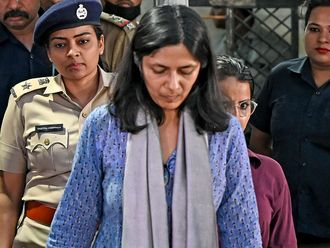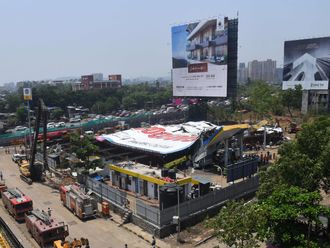
More than a hundred mortar shells rained down from nowhere. There was fire everywhere. Simultaneously, military units positioned close to the prison units were attacked to preoccupy them and force them to move into positions further away. Four car bombs were detonated — some observers said that at least nine suicide bombers detonated their deadly packs at the same time — scattering body parts all over. Inside the prison, inmates set blankets on fire to distract jail authorities.
No, I am not depicting a scene from a military confrontation in Afghanistan, Syria or Libya. I am merely relating what happened a few days ago at two locations in Baghdad — near the Taji prison facility and the notorious Abu Ghraib prison. More than 1,200 prisoners were freed and around 40 jail wardens and inmates were killed in the attacks.
Both accounts are real and underline the capability and training of Al Qaida militants, which are way better than the weak US-trained Iraqi army.
It is known in Iraq that former Iraqi army officers — irresponsibly sidelined by Paul Bremer, the US administrator of the Coalition Provisional Authority of Iraq — have trained insurgent groups well, teaching them logistics, synchronised attacks, and how to shoot down military aircraft.
This validates my question: Is Al Qaida still a force to reckon with in Iraq? Regrettably, the answer is yes, which makes Iraq — an almost fallen state today — a very dangerous place.
I was not surprised when Interpol issued a warning to the effect that both the prison-breaks could be a threat to global security because the escaped prisoners included 12 Al Qaida leaders.
I do not believe these convicts will threaten global security, but they will most certainly impact the existing fragile environment in Iraq.
Sure enough, less than four days after the prison-break, 14 cars were detonated all over Baghdad at random locations — both Sunni and Shiite. This means that Al Qaida is back in business as usual, but with a new gusto and a greater thirst for the blood of innocent Iraqi civilians.
The Ministry of Interior issued a long and useless communique, pointing out that citizens must be alert. The only words that rang a bell were that the country is being pushed towards a sectarian civil war!
However, I do not believe the country is on the brink of civil war. Iraqis of all sects and religious affiliations are not fighting each other. At least 800 civilians are being killed every month, which is lower than the toll in 2006. It is Al Qaida in Iraq that is responsible for the killings, not the civilians or the political blocs fighting each other.
Iraqis are not being conned into sectarian warfare despite Al Qaida’s lethal efforts to push the two major sects towards an all-out confrontation. Al Qaida has grown stronger in Iraq because of the weakness of the Iraqi government that is also mired in corruption.
A common battleground has emerged in both Iraq and Syria. As the UN envoy in Iraq stated recently, it is not clear where the Syrian civil war begins, where it ends and where it overlaps with the conflict in Iraq. In other words, it’s fairly apparent that some of the escapees will get involved in Syria as well.
Once upon a time, the US would have used all its forces in the region to help the obviously incapable Iraqi troops salvage the deteriorating security situation. Nevertheless, taking into consideration the general destabilisation of the region and the US administration not wanting to be deeply involved in Iraq because of its initial experience, I do not believe it is an option anymore. The only way out for Iraqis is to change the structure of power and government that is changed every four years. What the country is experiencing now is clearly not working.
The 40 or so Iraqi ministries do not cooperate effectively because each literally belongs to a different political bloc.
Since the government is based on the political convenience of political blocs that regard each other as enemies, why not discuss rotating power every four years, according to the highest votes obtained in a democratic election.
Iraq does not need the Israeli or Lebanese form of elected government based on sectarianism and political differences. Iraq has been seeing a single power group dictating to others the best way to move forward, even for a limited time.
The system laid down by the US-Iraqi Council, which took over administration after the ouster of the former dictatorship, has to change. Else, the operation ‘Breaking of walls’, coined by Abu Bakr Al Baghdadi, leader of the Islamic State of Iraq, that was kicked off by the two prison breaks, will continue for a whole year as he has threatened.
Hoping that Iraqis will bear the violence along with the shortcomings of the government for a whole year is a bit too much.
If the security situation continues to deteriorate in Iraq, one fears that Al Qaida will be strengthened to the point that no one will be able to combat its terror network in the region.







